Tea Production
Tea production involves a number of meticulous processes that define the quality and flavour of the tea being produced. The location around the world will have a bearing on the type of tea you can make; similar to the 'terroir' when growing wine, tea has the same impacts from climate, altitude and seasonality.
In essence, all tea is harvested in a similar way, this being the leaf is removed from the bush. However, by processing tea in different ways creates different kinds of finished product.

For example the more oxidization the tea has, the darker the infusion will become. So for green tea, there is the least oxidisation and the tea retains its light green colour.
Most kinds of tea go through a process of plucking (harvesting), withering, rolling (cutting), oxidation and drying or firing. Here's what each of these terms mean -
Plucking or Harvesting
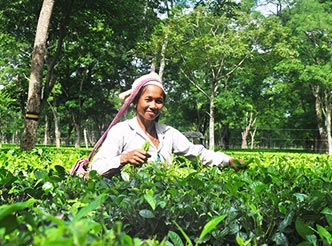
As a first step in the tea production process, fresh young shoots are carefully plucked off the top-most portion of the tea bushes. It is these young shoots that hold the key to quality and the highest level of care and supervision is required to achieve this. At McLeod Russel, we follow a stringent quality-control system during plucking to ensure only the very best plucked leaves enter our factories to produce the highest quality of tea.
Withering
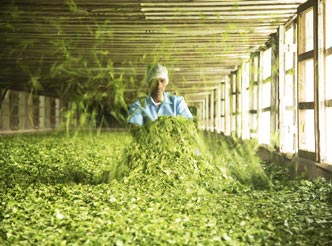
The freshly plucked tea leaves arrive at our factories and are spread evenly on the withering troughs. Using fans that blow hot and cold air through the leaves, the moisture content in the leaves is reduced by 28%-32% (known as the chemical wither) so concentrating the juices within the leaves. This process lasts for between 14 to 16 hours depending on the ambient conditions outside the factory complex. The green leaves are now limp and flaccid (known as the physical wither) and can be sent to the processing area.
Processing
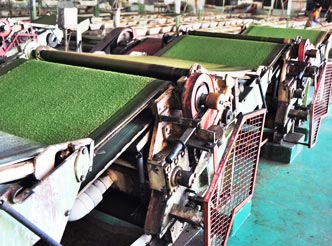
The withered tea leaves can be either rolled to make Orthodox tea or rotorvaned prior for CTC teas (i.e. preconditioning of the withered leaf). The CTC (Crush, Tear and Curl) process lasts for about five-seven minutes. The Orthodox roll process lasts about 30 minutes. In both cases the rupturing of the leaves cell walls releases the juices from within and coats the outside of the particle, exposing the juices to the air and oxidization begins.
Fermenting
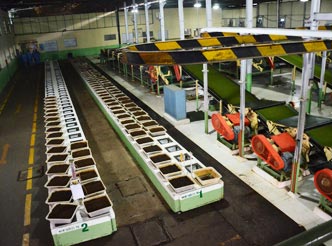
Fermentation is the oxidation process for both the CTC and Orthodox 'maal' and lasts between 100 to 180 minutes, depending on the colour and smell (nose) of the fermented leaf and also which initial process has been used. It is at this point that, when making black tea varieties, the green 'maal' turns a coppery red colour. Our factories use various types of fermentation processes such as 'Gumlah' fermentation and Continuous Fermentation Machines, whilst in Africa, larger fermentation trollies are used, but the same process is carried just in larger volumes.
Drying
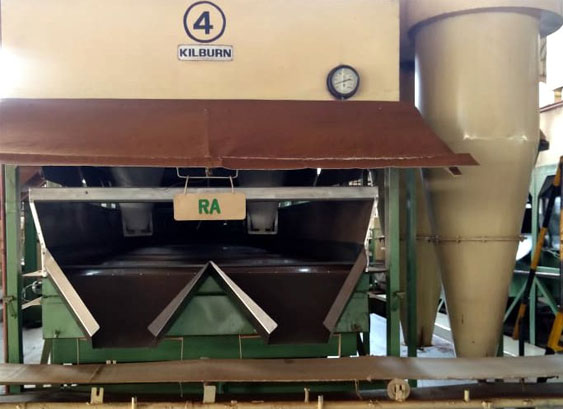
To halt the natural process of oxidisation and to remove moisture, the 'maal' is fed into large ovens known as driers in a regular manner and is subjected to temperatures of between 121°C and 127°C with controlled throughput time of 22 to 25 minutes.
All the fermented CTC tea is dried in VFBDs (VibroFluidised Bed Dryers). However, Orthodox tea is dried using conventional driers that convey the leaves on slow-moving, perforated trays through the drying chamber, thus preserving the natural bloom, liquor and taste of the tea.
Sorting & Grading
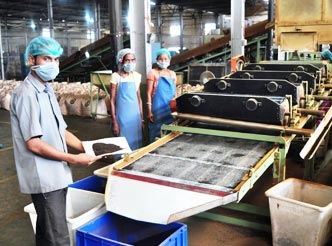
The 'black' made teas can now be sorted into Primary and Secondary grades by passing them through sorting machines that use trays of meshes varying in sizes that separate the different size particles into similar sized batches of the same type of grade of tea.
CTC teas are also passed through fibre extractors to remove excessive fibre and the sorting of these will produce primary and secondary grades. Primary grades comprise 90-94% of the product line; the remaining tea is regarded as Secondary grades. Some examples of black tea grades are given below, these initials refer to the recognised grade. For example, the CTC initials BOP stand for Broken Orange Pekoe, PF stands for Pekoe Fannings and for Orthodox grades TGFOP1 stands for Tippy Golden Flowery Orange Pekoe 1.
| The Primary CTC grades | BPS, BOP, BP, PF, PD, D, CD |
| The Secondary CTC grades | BP1, D1, CD1, RD |
| The Orthodox grades | TGFOP1, TGFOP, GFBOP, FBOP, GBOP, BOPF, OP, OP1, BOP1, BPS1 |
Packing

Following the sorting process, a grade of tea is bulked together and stored in climate-controlled bins.
The packing process involves the transfer of a single grade of bulked tea from a storage bin to the packing area. The tea is then carefully measured and funneled into large kraft paper sacks (other variations of packing material also exist), sealed and gently placed on wood pallets. Through containerisation, ten layers of two sacks (equaling 20 sacks) can be stacked on each pallet.
It is at this point that an invoice (or 'Lot') of tea is created. Invoices can vary in size from 5 to 100 paper sacks. Each invoice (whichever packing material used: kraft paper sacks, vacuum packaging or jute bags) is then given a unique identity number - an Invoice Number. Throughout the invoice's life, this unique number is a traceable record.
To comply with strict European and North American traceability legislation, McLeod Russel also identifies each and every individual package with its own unique number, further adding to the Best Practice policies. The packed tea is then sent to market centres and ports by containerized trucks.
Quality Control

Each and every invoice of our tea is tasted by our professional tea tasters based on the estates. We meticulously ensure that all our tea is carefully monitored for the highest possible quality so that only the best teas leave our factories. However, if any corrective action is identified by our tasters' immediate action is taken to eliminate any defects before the teas reach our customers.
Vacuum Packing
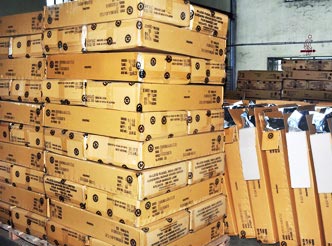
In the mid-1980s, McLeod Russel introduced a revolutionary new packaging concept that guaranteed storing of tea in as fresh a condition as possible. Using this unique technique, which received wide acclaim as the best way to store tea, we have worked closely with a select few core customers, assisting the introduction of their new product ranges. Our bespoke machinery and packaging materials have allowed our tea to be safely stored for much longer periods than the 18 months normally seen as tea's perishable life.
Bespoke & Bulk Manufacture
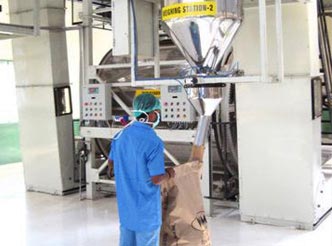
Find out what McLeod Russel can do for your blends.
Blending Units
Pallets & Slip-sheets
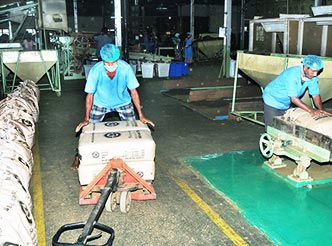
Through the introduction of containerization in the mid-70s, we export all our tea on pallets and slip sheets thus meeting our customers' requirements of the quality of materials used for delivery. McLeod Russel prides itself on maintaining strict practices to ensure that any timber used in pallet construction meets the legal requirements when importing teas into foreign countries.
All our pallets meet the ISPM 15 standard. ISPM 15 is an International Phytosanitary Measure by the IPPC that directly addresses the need to treat wood materials of a thickness greater than 6mm, used to ship products between countries. It affects all wood packaging material (pallets, crates, dunnages etc.) requiring that they be treated with heat, fumigated with methyl bromide, or made from an alternative material like paper, plastic or manufactured wood products (e.g. plywood). New treatments are being evaluated for inclusion in ISPM 15.
The increased usage of slip-sheets has allowed McLeod Russel to reduce its demand on timber and thereby, on the environment. We are proud of our ability to meet our customers' individual shipping requirements, as we share their view of limiting the impact of our industry on the environment.
Logistics & Services
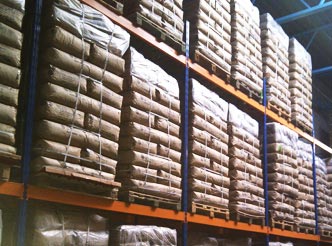
McLeod Russel has been supplying tea to all the major tea blenders worldwide for over a hundred years. We have a dedicated sales and shipping team to facilitate all our customers' wishes and have a reputation equal to none throughout the industry for product quality, timely deliveries and after-sales service.
Our tea is bought in bulk and wholesale basis by our customers and is supplied in multi-walled Kraft paper sacks or vacuum packaged, meeting the numerous international standards for safe food transportation. Individual invoices are containerized in 20ft and 40ft containers and shipped in accordance with our clients' wishes and strict timescales.



